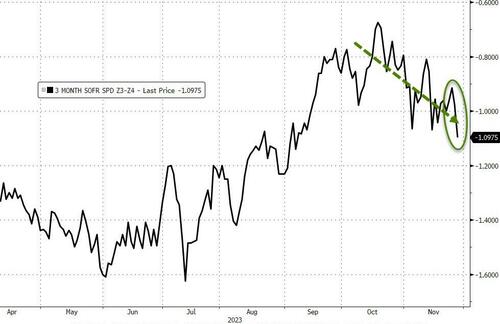(C'est prévu, non, faire souffrir les petits pendant que les gros profitent de la vie ? note de rené)
Did Deutsche Bank Economists Just Imply The Fed Will Create More Inflation In 2024?
Authored by Michael Maharrey via SchiffGold.com,
Deutsche Bank economists say the Federal Reserve will create more inflation in 2024.
OK, that’s not exactly what they said. But that is the implication of their latest forecast.
The Deutsche Bank analyst forecast that the Fed will cut rates by 175 basis points in 2024 in response to a “mild” recession. That would drive the Federal Reserve funds rate down to between 3.5% and 3.75%.
This loosening monetary policy, by definition, would create more inflation.
The Fed currently has interest rates set at between 5.25% and 5.5%.
Most mainstream analysts now think the central bank will cut rates next year, but not as steeply as Deutsche Bank economists.
The dominant narrative today is that the Fed has successfully beaten down price inflation. A cooler-than-expected CPI report for October reinforced this notion. With inflation on the run, mainstream analysts think that the Fed has initiated its last hike and will pivot to rate cuts next year to guide the economy to a “soft landing.” Even before the CPI data release markets were pricing in 75 basis points of rate decreases in 2024.
[ZH: The market is pricing in 110bps of cuts next year after yesterday's comments from Fed Gov. Waller]
Many mainstream analysts and financial news network pundits have taken a recession completely off the table. But Deutsche Bank senior US economist Brett Ryan told Reuters he expects the US economy to hit a “soft patch” that will lead to a “more aggressive cutting profile.”
Ryan said he expects this economic weakness to further ease inflationary pressure.
The Problems With the Forecast
There are several problems with the Deutsche Bank projections, and the entire mainstream narrative more generally.
In the first place, the death of inflation is greatly exaggerated. No matter how you slice and dice the data, none of the numbers come close to the Fed’s 2% target. Core CPI is still double that number.
Ryan says the “mild” recession will put additional downward pressure on price inflation, but the monetary policy he expects the Fed to follow is inflation.
Rate cuts will ease financial conditions and allow for more money creation and credit expansion.
Rising prices are a symptom of monetary inflation.
And monetary inflation is exactly what we will get when the central bank reverts to a looser monetary policy.
In other words, as soon as the Fed declares victory and starts cutting rates, inflation wins. The Fed goes right back to the inflationary policy that got us into this mess to begin with.
It’s also important to note that even with interest rates at 5.5%, monetary conditions aren’t tight. The Chicago Fed’s Financial Conditions Index confirms this. As of the end of Nov. 17, the index stood at -0.47. Any negative number indicates loose financial conditions. So, despite all of the tightening, the Fed is still running a slightly inflationary monetary policy.
Deutsche Bank projects the Fed will loosen policy even more next year, and yet we’re supposed to believe inflationary pressures will ease.
Second, while an economic downturn can dampen demand and cause some prices to drop, recessions come with their own inflationary pressures, especially when the Fed cuts rates. Those inflationary pressures come in the form of a weaker dollar.
Peter Schiff has pointed out that dollar strength helped do the Fed’s inflation-fighting work over the last year or so. As the dollar rose, commodity prices dropped, driving the CPI lower.
The gains that have been made with respect to measuring inflation have been because of the strong dollar. But here’s the problem; the minute the Fed claims victory, or even the markets think that the Fed is winning, even before the Fed actually declares ‘mission accomplished,’ the markets start trading down the dollar. The dollar starts to fall. As long as the markets think the Fed is winning, the dollar will keep falling. It was when they thought the Fed was losing that they wanted to buy dollars because that meant the Fed was going to fight harder and have to raise rates. But if the fight is over and the Fed has won, well, then there are no more rate hikes.”
Finally, the looming recession isn’t going to be “mild.” In fact, the much anticipated “soft landing” is impossible.
Schiff raises a key question: why do people think the Fed can raise rates from 0 to over 5% and get away without plunging the economy into a recession?
Why would that be if you look at the recent experiences with the Fed having rates too low and then raising them? Go back to the late 1990s and the decline we had in the economy, the recession, the stock market in 2000-2001. Look at the experience in 2008. And look at what happened even before COVID in 2018 when the Fed tried to raise rates from a low level and had to abort it very quickly when the wheels started falling off the bus in the fourth quarter of that year.”
History makes it clear that the Federal Reserve has a hard time normalizing rates. In fact, the attempt to bring rates from around 1% to just over 5% in 2007 led to the greatest recession since the Great Depression.
So, why would anyone believe that the Fed can normalize rates now and not have a similar consequence? Because, after all, the rate hikes expose all of the malinvestments and the misallocation of resources that take place when rates are artificially low.”
The Deutsche Bank forecast is less optimistic than most mainstream projections. Its economists at least recognize the looming recession on the horizon. And they are likely correct that the Fed will cut rates next year — or at whatever point this bubble economy pops. But they are wrong to think that the economic downturn will be short and mild, and that it will be deflationary. It will be the exact opposite. When the economy crashes, the Fed will cut interest rates – likely back to zero. And it will almost certainly go back to quantitative easing.
That’s inflation.
So, when you boil it all down, without realizing it, Deutsche Bank economists are projecting more inflation — not less.
In fact, they’re reading the recipe for stagflation.


Aucun commentaire:
Enregistrer un commentaire